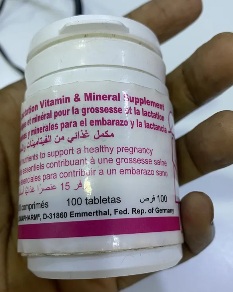Small Pill, Big Impact: How Multiple Micronutrient Supplements Are Improving Maternal Health in Bauchi
- Home
- Small Pill, Big Impact: How Multiple Micronutrient Supplements Are Improving Maternal Health in Bauchi

- 25 Apr, 2025
- Faith Kegh
- comments off
Small Pill, Big Impact: How Multiple Micronutrient Supplements Are Improving Maternal Health in Bauchi
In Bauchi State, pregnant women like Hajara Abdullahi are seeing health improvements after switching to Multiple Micronutrient Supplements (MMS). Hajara shared that since she began taking MMS, her appetite and energy levels have improved significantly.
Micronutrient deficiencies remain a major health issue for mothers and children in Nigeria, especially in the north. High-nutrient foods like meat and liver are often unaffordable, leading to widespread anaemia. In fact, over 68% of women in Bauchi, including pregnant women, are anaemic according to the 2018 Nigeria Demographic and Health Survey.
Recognizing this, the World Health Organization recommended in 2020 that countries with nutritional gaps replace Iron and Folic Acid (IFA) supplements with MMS. Unlike IFA, which contains just two nutrients, MMS offers a broader range—15 essential micronutrients—helping prevent anaemia and improve birth outcomes.
Supported by the Nigerian government and Bauchi State, Nutrition International launched a three-year pilot project to distribute MMS as part of antenatal care. The program is active in 84 primary healthcare centres and two general hospitals in Dass and Giade LGAs. Since November 2023, over 25,000 pregnant women have received MMS.
Each woman gets a bottle containing 100 tablets, intended for daily use over three months. Instructions and a daily tracking sheet—written in Hausa for better accessibility—help guide them. However, nutrition experts emphasize that MMS is not a substitute for a balanced diet.
Asabe Lekwot of Nutrition International explained that MMS helps prevent deficiencies, supports fetal development, and boosts maternal immunity with vitamins like A, C, and D. It also reduces risks of complications like preeclampsia, low birth weight, and premature delivery.
Many women who previously experienced side effects from IFA reported better tolerance with MMS. Some even noted avoiding blood transfusions in their latest pregnancies after taking MMS.
Ongoing research in Bauchi is tracking the supplement’s effectiveness. Early results show improved haemoglobin levels among users, according to health workers.
Despite its benefits, challenges remain. MMS isn’t suitable for treating severe anaemia due to its lower iron content, and some women—particularly younger or first-time mothers—show low adherence. Staff shortages in health facilities also affect distribution.
Efforts are underway to expand the program across Bauchi and beyond. UNICEF and the Gates Foundation have provided over a million bottles of MMS to support scaling up. However, experts stress that long-term success will depend on government investment and inclusion of MMS in future health budgets.

Content & Editorial Manager – Leads the creation, review, and publication of high-quality news and media content. She ensures that all editorial work reflects the organization’s standards of accuracy, professionalism, and relevance, while also engaging and informing the audience.
As the key driver of TokinPoint Media LTD’s editorial voice, the manager oversees content planning, assigns tasks to writers or editors, enforces deadlines, and ensures consistency across all platforms. She also plays a strategic role in aligning content with audience interests and search engine optimization (SEO) best practices.
Discover more from TokinPoint
Subscribe to get the latest posts sent to your email.
- Share
Faith Kegh
Content & Editorial Manager - Leads the creation, review, and publication of high-quality news and media content. She ensures that all editorial work reflects the organization’s standards of accuracy, professionalism, and relevance, while also engaging and informing the audience.
As the key driver of TokinPoint Media LTD's editorial voice, the manager oversees content planning, assigns tasks to writers or editors, enforces deadlines, and ensures consistency across all platforms. She also plays a strategic role in aligning content with audience interests and search engine optimization (SEO) best practices.
